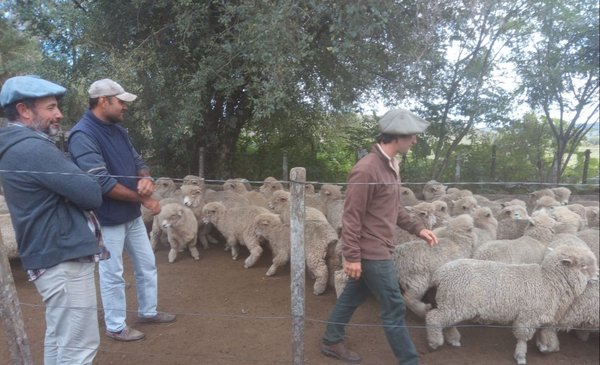Six years ago and in a “very timid” way, as recalled by Mariano Rodríguez -president of the Corriedale Breeders Society of Uruguay (SCCU)–, the union signed a agreement with the Ministry of Social Development (Mides) so that small rural producers could buy sheep of the breed, using a Microfinance credit (BROU) to be paid in two years.
The project started with few producers. When the period of the previous government ended, there were 54 ranchers throughout the country who had started the activity through this agreement and currently there are 157. The union estimates that it will support more producers this year and reach a total of 270 involved.
have desire to work
The requirement to access Corriedale specimens in this way, Rodríguez pointed out, is one: “Being a small producer and really wanting to work”.
The producers who have accessed sheep in this way have fields of between one and two hectares, an area that for 15 sheep –the average each one has– “does well”.
Those interested in accessing the agreement must contact the Mides offices throughout the country, where it is evaluated if the profile is suitable for the project.
Mides and the Soc de Criadores de Corriedale delivered 50 sheep of high genetic value to 5 small producers in the department of Flores.
It is not a gift, each one will have the possibility to pay 30% of the value of these animals with lambs and the rest in pesos without interest #measure pic.twitter.com/qUvhN7Ivfp– Andrés Carrato (@AndresCarrato) May 20, 2020
a good income
The SCCU’s job in this agreement with the ministry is to procure, through its partners, the sheep that the producers will buy.
In total, 1,500 sheep are needed per harvest to cover the demand, although there are currently around 700 for this harvest, commented the president of the breeders. The offer is distributed throughout the country.
As highlighted In recent years, the demand for rural producers to buy specimens of the breed has increased through this agreement, “because people have realized that it is a good income”. “In many cases, the sheep has given the possibility of sending the gurises to study with the income that has been generated, and that is why the society of breeders can feel nothing but pride, because it has taken us a lot of work,” he said. .
It is the responsibility of the union to ensure that the specimens that go on sale have “important genetic material, which is of quality, to ensure that these sheep are representative of the breed,” he added.
During the year the producers have five technical visits in which they are helped to make important decisions, such as driving, for example.
not a gift
This agreement “is a social milestone that the society of breeders fulfills, of which we are very proud,” he mentioned, and stressed that both the public and private sectors work in harmony and with permanent dialogue, and that the important thing is that the sheep given to those who are given the opportunity to work to pay for them, it is not a gift.
“The breed society is very proud to be part of this that today is taking a really interesting flight. Many times we see that it is given and given from the State, and it fills us with pride that in this case they are sold and financed so that they have the capacity to pay. It is important as a country to have the possibility to help, but also that whoever receives this help fulfills the commitments”, he expressed.
5 small producers from Flores are already part of the agreement between Mides and the Corriedale Breeders’ Society to promote sheep production for small family producers.
In turn, there are 5 new small producers that are integrated from next year.#measure pic.twitter.com/KTSMwmkzU5– Andrés Carrato (@AndresCarrato) September 10, 2020
the moment of the race
The breed has been working in a good way, fully adapted to the country, explained the president of the union. In recent years, breeders have gone towards a thinning of the wool and a development of the meat part.
A survey carried out by the observatory of the society of breeders shows that between 75 to 80% of the producers’ income is from the sale of meat. “Today the business is very good,” Rodríguez said about the meat industry and this breed, “there is a very good price, around US$4.5 per kilo per lamb, with a high demand from the industry for all the categories and a good competition in the industries”, he added.
Regarding the wool business, he explained that they are still waiting for the market “to move a little more.” Internally, some deals have been made with prices approaching US$2 per kilo for the wool of this breed, he indicated.
“It has not been an easy time for us to sell wool, but luckily it is a non-perishable good that can be saved”he said, and maintained that all the producers are worried because the offer does not meet the demand and the price, although there is hope that these points will come together and the deals will be completed.
The national sheepfold has been maintained and although some producers chose to crossbreed to refine the wool, today they are returning to the Corriedale, he said, considering another relevant issue.
In the mutton harvest, specimens of this breed were sold for around US$1,000, which shows the interest of ranchers in these animals.
“The breed is maintained and develops very well throughout the territory. Part of the reactivation of the sheep stock goes through the Corriedale, above all because of its capacity to produce twins, and the way in which it is adapted to the environment. Corriedale is an important actor in the national ovine culture”, he reflected.
Dog attacks, a never-ending problem
Dog attacks on sheepfolds, which occur almost daily in different parts of the country, are something that worries breeders in Corriedale.
For Rodríguez, president of the union that brings together producers of this breed, what is needed is to solve the problem of controlling dogs that are loose, both in towns and in rural areas.
“Producers protected by the Rural Code in many cases know what they have to do, but it is not the definitive solution either. This is a very sensitive issue, but one in which decisions have to be made. We believed a lot in the creation of the National Institute for Animal Welfare and we see that it does not have many tools to take action. I think that the municipalities are taking part, but it is a matter of responsible ownership of the whole society. The refuges are overflowing and deep measures must be taken”, he indicated, and stressed that the damage, more than economic, is emotional for the producers, who in many cases lose years of genetic progress in their production systems.
The Corriedale tour returns and it will be in Lavalleja
The tour will pass through the estates of the Peña family; by Doña Elisa, from Larrosa; for The Courage, by Mario Dighiero; by the property of Pedro Dartayete; by San Salvador and by San Gerardo, of the García Pintos family. On Thursday night the producers will stay in Minas.
“This is a very sheep-producing area to which the breed is very well adapted. I think it will be a nice tour and in the area we have the opportunity, without doing many kilometers, to see many options for sheep production, both commercial flocks and farms”, highlighted the president of the breeders’ society.


















